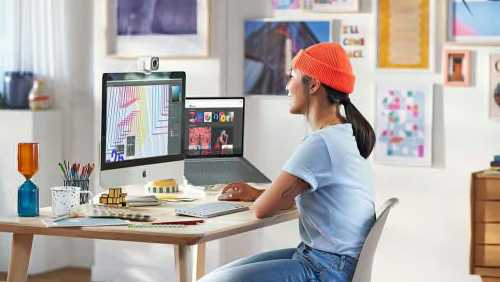Danielle Boyer Creates Safe, Accessible STEM Spaces for Indigenous Communities
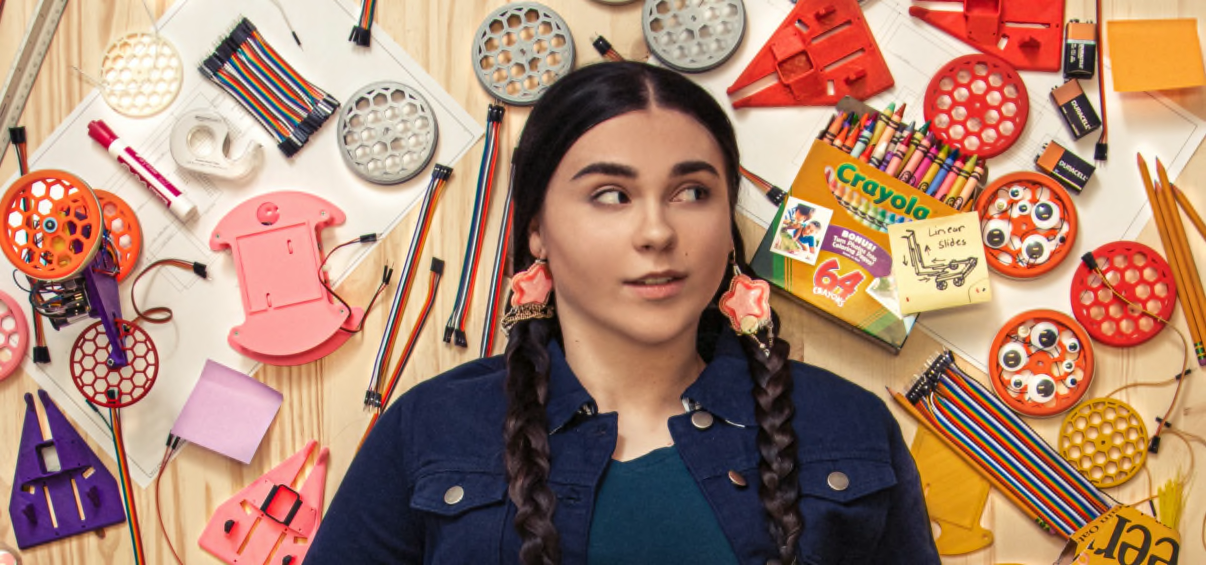
Danielle Boyer wants every kid to have a safe space to learn science, technology, engineering, arts and mathematics (STEAM) skills. The kind of fun, inclusive space she never had. That’s why this robotics inventor and youth advocate founded The STEAM Connection. Danielle is an Indigenous (Ojibwe) and Queer woman and is this month’s Logitech MX #WomenWhoMaster feature. She shared what led her to launch her nonprofit, who inspires her, and why uplifting Indigenous communities is important to her.
Q: When did you first get into robotics?
I was homeschooled for most of my life. Then when I got to high school, I joined a robotics club. It was a really big deal because it cost hundreds to participate. I was so excited but it was a difficult time. I was the only girl and was not treated well. A lot of the guys bullied me. I was stalked with drones and harassed a lot. It was really discouraging because I just wanted to learn about robots. I ended up quitting the team.
My experience prompted me to start my own charity, The STEAM Connection, because no kid deserves to have a space where they don't feel safe learning, especially young girls.
Q: What is The STEAM Connection?
The STEAM Connection is a nonprofit that works to increase technical education accessibility for Indigenous students. There are a lot of large accessibility gaps within STEM, especially for Native students. Specifically lack of internet access and lack of representation — there is less than half a percent of Native people in engineering. We create safe learning spaces for students to learn STEM skills. Over four years we have given more than 600,000 kids free technical learning resources.
Q: What are the top STEM skills the next generation should learn?
Coding, 3D design, and electrical engineering are the most important skills. Base-level skills in artificial intelligence and augmented reality are also important. Those are all things that we teach with the robots and we have even implemented a new augmented reality curriculum. Also, our new robots work on artificial intelligence and internal base systems that work without Wi-Fi, because that's a huge accessibility gap for many of our communities.
Q: The EKGAR robot is a big part of The STEAM Connection. What does EKGAR stand for?
I created EKGAR when I was 18 years old. The name stands for Every Kid Gets a Robot. It's a free robotics kit that's made out of recycled plastic and has gone to over 8,000 kids. It's like a little remote-controlled car that students build, wire, and code themselves. I created EKGAR for $18.95 because I was seeing robots cost hundreds and hundreds of dollars and I was like, "There has to be something better out there."
Q: What other robots have you built?
We have a lot of different creations, but my favorite is the SkoBot, an Indigenous language learning robot. It’s the first cultural robot ever created. It’s wearable and teaches Indigenous languages. Kids can customize SkoBot too. In our communities, we have different regalia or cultural clothes. Students are able to decorate the robot with their regalia. It's really exciting to see the kids relate so much to the robots.
A lot of the work that we've done at The STEAM Connection surrounds cultural and language preservation. My language, Ojibwemowin, is endangered.
"Creating resources to uplift students in a way that they relate to — whether it's having role models in STEM who are Native or providing classes, resources, or robots that resonate with kids — matters a lot to me."
Q: What have been some student reactions to your robots or The STEAM Connection that have meant the most to you?
One student said I was the first Native woman who builds robots that she's ever met and that it made her want to do it too. That was a huge encouragement to me to keep doing what I do.
I've experienced a lot of racism and harm in STEM spaces, and it can be very discouraging. Hearing from my students pushes me to keep going. I appreciate comparing where students today are to where I was at their age. It’s exciting to see kids today as leaders and creating really cool things because
"Indigenous peoples were always scientists and innovators but a lot of that was taken from us because of colonization."
So now being able to decolonize modern STEM spaces and create safe learning environments to reinvest in skills that we've always had, is really important. And seeing the kids thrive in that makes me so excited for the future.
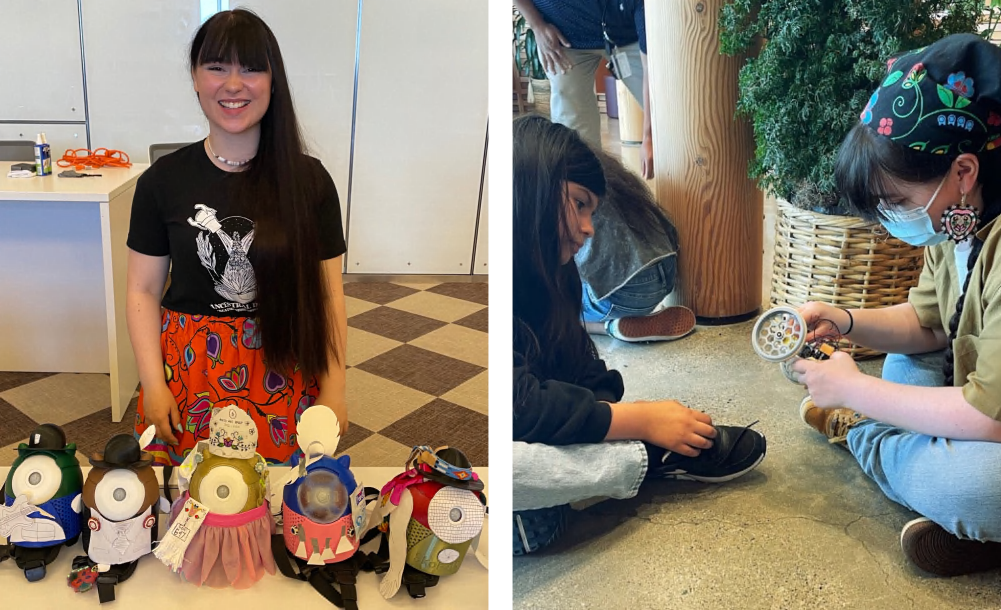
Q: While you were launching The STEAM Connection, who were the mentors who helped you and gave you advice?
Even though my mother and grandmother are not really technical people, they helped me the most. My grandma inspired me to create my work. She always calls me and sends me encouraging messages. She also reminds me to be myself, a good role model, and a good relative.
My mom says to pour into others, you have to pour into yourself first. Investing in yourself, investing in self-care, and taking care of your mental health is the foundation to uplift other people.
Q: How do you bring your whole self to work?
By working with students and people who have the same background and share my experiences. Not having to explain myself or talk about difficult things I’ve experienced is really important. In many spaces, I have to teach people or advocate for myself and my community. When I work with other Native people, I don't have to do that. I can just be myself and I love that so much.
Q: Where do you hope the industry goes in the coming decade?
I want to see more accessible routes toward academia and STEM careers for everyone, safe spaces to work in, and more leaders who are minorities at major tech companies. There are so many early barriers to entry in STEM, it’s difficult to even get to the spot where a good university is a choice. Then when students get into STEM careers, it’s not a safe space.
"I also want to see the knowledge of people outside of traditional academia respected. A lot of our knowledge comes from elders. But in academia, people don’t take that seriously."
They don't see it as a verifiable source for papers or studies. There's a huge disconnect between Indigenous knowledge and ways of relating to the world and spaces in academia or tech.
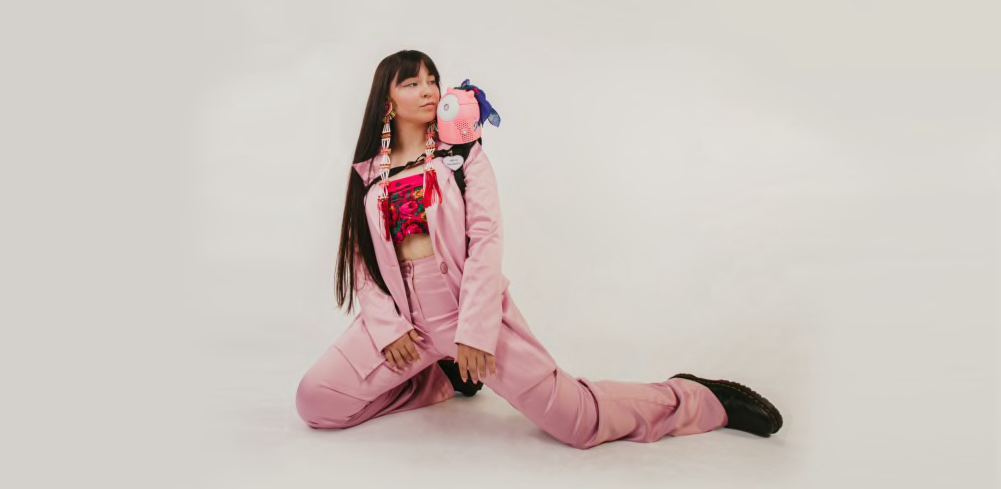
Connect with Danielle on LinkedIn, Instagram, and Twitter. Learn more about her work on her own website or at The STEAM Connection.
Women Who Master puts a spotlight on women who have made outstanding contributions to STEM fields. The goal of the series is to celebrate those contributions, inspire future leaders, and help close the gender gap in technology.
Photo credit: Danielle Boyer
#WOMENWHOMASTER
MEET THE MASTERS AT THE FOREFRONT OF STEM
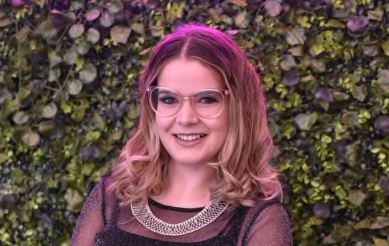
Kate Kirwin
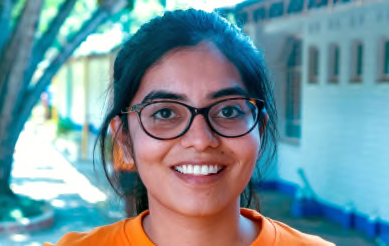
Kavya Krishna
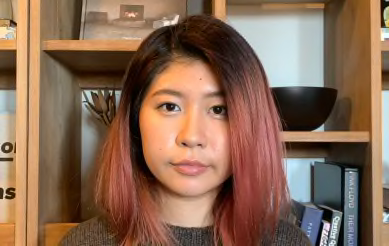
Yuko Nagakura

CODECADEMY AND LOGITECH
Partnering to inspire the builders of tomorrow, MX Series and Codecademy give you the tools needed to build, scale, and code to your fullest potential. Learn essential coding, programming, and AI skills to reimagine the future of tech with one free month of Codecademy Pro.

Women Who Master
Logitech MX is committed to spotlighting and supporting impactful initiatives and individuals that are disrupting the industry worldwide, to inspire girls and women to pursue a career or continue thriving in STEM.
With #WomenWhoMaster, our mission is to ignite an industry-wide movement that addresses the gender gap and unequal access to opportunities in tech and IT, once and for all.
